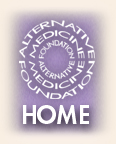|
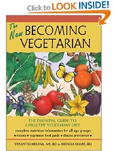 |
Vesanto Melina and Brenda Davis The New Becoming Vegetarian: The Essential Guide To A Healthy Vegetarian Diet Healthy Living Publications 2003 Comprehensive and well-researched, this new edition provides everything you need to know about making a healthy transition to a vegetarian diet or maximizing its benefits if already a vegetarian.
Updated with the latest recommendations for intakes of vitamins, minerals, proteins, and fats, the authors show how to achieve optimal nutrition for all stages of life. Easy-to-read tables, figures, menus, and food guides help you determine how to meet your nutritional requirements. You'll also learn what plant-based dietary components and factors play active roles in both the prevention and treatment of chronic illnesses. And for practical application, over 50 new and easy recipes show how to incorporate highly nutritious ingredients - some of which may be unfamiliar. |
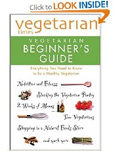 |
the Editors of Vegetarians Times Vegetarian Times Vegetarian Beginner's Guide Wiley, 1996 In this introduction to the vegetarian lifestyle, the editors of Vegetarian Times describe the various types of vegetarianism. Stressing the health value of the vegetarian lifestyle, especially in the treatment of various diseases, they point out the possible dangers of dairy foods, discuss whether to use vitamin supplements, and encourage the use of low-fat ingredients. Tips on the basic vegetarian pantry, along with two-weeks' worth of easy recipes and menus, are given for the beginner. Reading resource material is found at the end of each chapter, and there is a small section on natural healing; food-borne illnesses; vegetarian babies, children, and teens; and, yes, even vegetarian pets. |
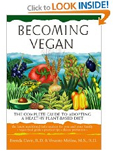 |
Brenda Davis and Vesanto Melina Becoming Vegan: The Complete Guide to Adopting a Healthy Plant-Based Diet Book Publishing Company, 2000 The authors of Becoming Vegetarian explore the benefits of a vegan diet (eating without meat, eggs or dairy products). More and more people are being motivated to become vegans because of the impact of their nutritional choices on their health, the environment, animal rights, and human hunger. As registered dietitians, Davis and Melina provide the latest information on: how a vegan diet can protect against cancer, heart disease, and other chronic illnesses; getting all the protein you need without meat; meeting your needs for calcium without dairy products; what vegans need to know about B12; why good fats are vital to health and how to get them balanced in diets for infants, children, and seniors; pregnancy and breast-feeding tips for vegan moms; considerations for overweight, underweight, and eating disorders; achieving peak performance as a vegan athlete; and how to deal gracefully with a non vegan world |
 |
Kristina Turner The Self-Healing Cookbook Earthtones publisher, 2002 A user-friendly guide to macrobiotics has become a well-loved classic. |
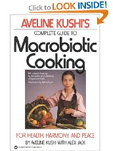 |
Aveline Kushi Complete Guide to Macrobiotic Cooking Warner Books, 1988 A classic guide to theory and practice of macrobiotic teachings. |
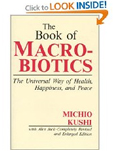 |
Michio Kushi and Alex Jack The Book of Macrobiotics Japan Publications, 1987 The Book of Macrobiotics has been completely revised and expanded to reflect refinements in Michio Kushi's teachings, as well as many new developments in the spread of macrobiotics in modern society. During this time, the Standard Macrobiotic Dietary approach has been simplified and broadened. Macrobiotic approaches to cancer, heart disease, and other degenerative diseases have evolved and expanded, as have basic home cares, and way of life recommendations. The revised edition of The Book of Macrobiotics also includes a new chapter on the Spiritual World, new material on Yin and Yang and the Five Transformations, Man/Woman Relations, and Humanity's Origin and Destiny, and an annotated East West Reading List for further reading and enjoyment. Many new illustrations have been furnished, and the Food Composition tables have been expanded to include nutritional information on dozens of foods such as tempeh, seitan, rice cakes, and amazake not previously available. |
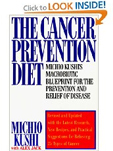 |
Michio Kushi Classic text detailing the macrobiotic diet for the use in chronic disease prevention and treatment. http://www.living-foods.com/bookstore/livingandraw.html Provides an EXTENSIVE selection of raw foods diet books and resources.
|
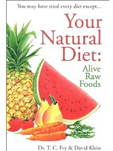 |
T.C. Fry and David Klein Teaches how to eat a biologically correct diet of raw fruits, vegetables, sprouts, nuts and seeds. The criteria for determining natural diet character, food combining guidelines and how to select the best foods is discussed. Includes sections on how to eat healthfully, how to avoid the pitfalls and many simple raw food recipes. |
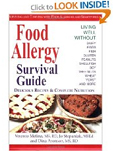 |
Vesanto Melina, Dina Aronson, and Jo Stepaniak A unique blend of scientific research, practical advice, and culinary expertise that will show you how to: know the difference between food allergy, food intolerance and food sensitivity; test for allergies; avoid the foods and ingredients that trigger reactions; maintain a healthy intestinal boundary; understand the latest food labeling regulations; and create menus that meet your nutritional requirements. Over 100 recipes included. |
 |
Dick Thom, N.D. A naturopathic doctor explains the process of diagnosing food allergies, intolerances, and irritants and then guides the reader through the confusing process of eliminating the offenders. Find new ways to shop for, cook, and enjoy substitutes for dairy, wheat, corn, and sugar. Identify hidden allergen sources. Monitor your progress with a checklist to determine your rate of improvement. |
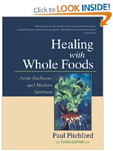 |
Paul Pitchford Healing with Whole Foods contains a wealth of information on health, diet, alternative medicine, natural food presentation, and recipes, researched by an expert in the field. Readers will learn how to apply Chinese medicine and the five-element theory to a contemporary diet; treat illness and nervous disorders through diet; and make the transition to whole vegetable foods. Includes complete sections on Ayurvedic principles of food-combining; the treatment of disease conditions through meals; transition from animal products to whole vegetable foods; micro-algae; selection of waters and salts; the extremely complex varieties of oils, sugars, and condiments; vitamins and minerals; fasting and purification; food for children, food presentation and proportions; vibrational cooking; the physiology of nourishment; color diagnosis and therapy; consciousness in diet changes; plus descriptions of the nature and uses of various grains, legumes, miso, tempeh, tofu, seaweeds, nuts and seeds, sprouts, and fruits. Also featured are sections on chutneys, relishes, pickles, different milks, rejuvelac, yogurt, salads, and desserts. |
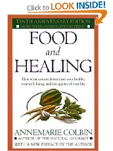 |
Annemarie Colbin Ten years ago, Colbin's Food and Healing stood at the forefront of the food revolution, exploring the link between diet and health. In this anniversary edition, she provides updates on recent dietary systems, including low-fat, food combining, and alternative medicine.
|
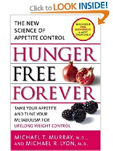 |
Michael T. Murray, N.D. and Michael R. Lyon, M.D. Naturopathic doctor Michael Murray, and conventional doctor Michael Lyon team up to explain the underlying physiology related to metabolism and appetite. Using a whole foods approach to nutrition, they apply science and naturopathic principles to healthy weight control. |
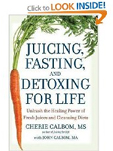 |
Cherie Calbom MS and John Calbom MA More than a simple collection of recipes, this book guides readers toward a lifestyle that promotes alkaline balance by juicing, eating well, and cleansing the body and soul. While most juicing books focus too much on fruit juice (which disrupts the body's pH balance with too much natural sugar), this book primarily focuses on juices, smoothies and soups made from vegetables. It also also offers a guide to the food richest in nutrients from Vitamin A to zinc and includes various cleanses to benefit the colon, liver, gall bladder, and kidney and more. Beyond the body, the Caboms explain the heavy toll emotional, mental, and spiritual unrest can take on the body (and sometimes even encourage disease) and share unique, effective methods for cleansing the body of such toxicity. |
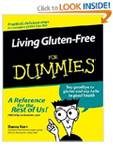 |
Danna Korn If you have a wheat allergy, gluten intolerance, celiac disease, or you just want to enjoy the benefits of a diet free of wheat, barley, and rye, then this guide is for you. Author Danna Korn explains the medical problems associated with gluten and shows you step by step how to make the transition to a gluten-free lifestyle. |
 |
Jordan Rubin A description of the author’s journey to health, promoting a diet based on the teachings of the Bible and foods eaten in biblical times, like kefir, lamb, sprouted breads, eggs and meat from free-range chickens, and plenty of fresh fruits and vegetables. |
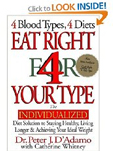 |
Peter D’Adamo and Catherin Whitney Presents the theory that your blood type is an evolutionary marker that tells you which foods you'll process best, and which will be useless calories. The book covers the entire range of foods for each of the four blood types, from entrées to condiments and seasonings, and also makes type-specific exercise and lifestyle recommendations. |
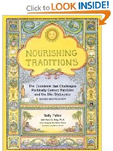 |
Sally Fallon A full-spectrum nutritional cookbook with a startling message--animal fats and cholesterol are vital factors in the human diet, necessary for reproduction and normal growth, proper function of the brain and nervous system, protection from disease and optimum energy levels. Includes information on how to prepare grains, health benefits of bone broths and enzyme-rich lacto-fermented foods. |
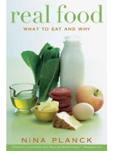 |
Nina Planck A successful manager of urban green markets, Planck presents a contrarian view of what constitutes sound nutrition. She urges readers to think back to the kinds of diets that their grandmothers ate, regimens full of foods fresh from farms and from individual purveyors: meats, dairy, and seasonal fruits and vegetables. |
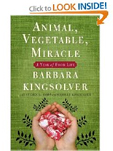 |
Barbara Kingsolver, Camille Kingsolver, and Steven L. Hopp This book chronicles the year that Barbara Kingsolver, along with her husband and two daughters, made a commitment to become locavores–those who eat only locally grown foods. The narrative is peppered with useful sidebars on industrial agriculture and ecology (by husband Steven Hopp) and recipes (by daughter Camille), as if to show that local food—in the growing, buying, cooking, eating and the telling—demands teamwork. |
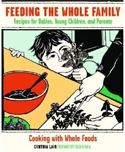 |
Cynthia Lair This book focused on an easy-to-prepare, sustainable, whole foods diet for the entire family. The third edition of Feeding the Whole Family adds chapters on balancing meals, planning shopping trips, drinks for kids, and over 60 new recipes to this edition. Over 180 recipes overall. |
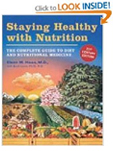 |
Elson M. Haas and Buck Levin Designed as an introductory textbook to teach the basic principles of nutrition and their applications, this hefty volume brings together a wealth of information for the serious reader. Part 1 analyzes the building blocks of nutrition; Part 2 evaluates foods and diets; Part 3 discusses building a healthy diet; and Part 4 explains nutritional applications. But this book also examines topics not usually found in textbooks--herbal supplements, homeopathic medicines, environmental aspects of nutrition, and detoxification and healing programs, to name just a few. |
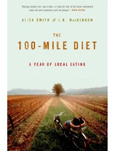 |
Alisa Smith and J.B. Mackinnon The remarkable, amusing and inspiring adventures of a Canadian couple who make a year-long attempt to eat foods grown and produced within a 100-mile radius of their apartment. |
There are various conventional and CAM based education programs and professional paths in the field of nutrition. The scope of practice and the term “dietitian” are specifically defined and a legally protected title in all 50 states. Dietitians are registered with the American Dietetic Association and are only able to use the title "dietitian" when they have met strict, specific educational and experiential prerequisites and passed a national registration examination.
The title "nutritionist" is protected and designated by many but not all states in the United States.
Traditionally, dietitians work in institutional settings, such as hospitals, schools and prisons, rather than in private practice. Nutritionists sometimes work in such institutions but more often work in private practice, in education and research. There is some overlap within the two professions.
A person seeking the counsel of a “nutritionist” could choose to check with their local state's licensing agency to find out if prospective practitioners are duly licensed. In those states that the title “nutritionist” is a legally protected title, the main distinction written into the licensing laws are requirements for specific education standards and supervised clinical training standards. In states where the title “nutritionist” is not legally protected, the training and education standards of the nutritionist are not uniformly set. There are many programs of study that are either distance learning based or limited in supervised clinical training that may or may not have met the standards set by the ADA. Often, the accreditation agencies of these programs are generally not recognized by the Department of Education.
Sometimes, the content of the programs that may not meet basic licensing standards are described as “holistic.” There are degrees earned in “nutrition” or “holistic nutrition”, and the person with that degree can not be licensed by states to use the protected “nutritionist” title because their education did not meet the licensing standards. It is helpful to note that it is not specifically the content of the curriculum that is not accredited by the DOE approved accreditation agencies. More so, it is the lack of DOE approved accreditation standards for clinical supervision and general curriculum standards of the specific education program.
Chiropractic doctors, naturopathic doctors, and acupuncturists are examples of other health care practitioners in CAM fields that do not use the term dietitian or nutritionist as a licensed title. However, they do have clinical training standards, licensing in all or some states, as well as a core scope of practice that includes clinical nutrition.
In conventional practice, medical doctors do have training in nutrition, but clinically most nutritional counseling done by the M.D. or D.O. is minimal or delegated to other practitioners, like dietitians, nurses or nutritionists. There are also multiple other avenues for receiving nutritional information in general public activities, including via personal trainers, health food store personnel, personal chefs, herbalists, weight loss programs, food service providers and manufacturers, public health programs, the media and more.
In the USA, nutrition professionals include the registered dietitian (RD) and the dietetic technician, registered (DTR). These terms, as well as simply dietitian, are legally protected terms regulated by the American Dietetic Association (ADA).
Dietitians are registered with the Commission on Dietetic Registration (the certifying agency of the ADA) and are only able to use the label "Registered Dietitian" when they have met strict, specific educational and professional prerequisites and passed a national registration examination.
A dietitian's education in health science involves significant scientific based knowledge in anatomy, chemistry, biochemistry, biology, physiology, nutrition, medical science. There are strong foundations in advanced scientific knowledge and an internship that enhances counseling skills and aspects of psychology. This helps them to assess, analyze, intervene, and educate a patient in relation to the diet and disease.
There are a few different academic routes to becoming a fully qualified registrable dietitian:
- A professional bachelor degree in Dietetics which requires four years of studies or
- A bachelor of science degree and a postgraduate diploma in Dietetics or
- A bachelor of science degree and a master's degree in Dietetics
Besides academic education, registered dietitians must complete up to a year long dietetic internship of at least 1200 hours through an accredited program before they can sit for the registration examination. The dietetic internship requires the intern to complete several areas of competency including rotations in clinical, community, long-term care nutrition as well as food service, public health and a variety of other worksites.
Once the degree is earned, the internship completed, and registration examination passed, the individual can now use the nationally recognized legal term, Registered Dietitian, and is able to work in a variety of professional settings. Most states require additional licensure to work in most settings. To maintain, the RD credential, professionals must participate in and earn continuing education units 75 hours every 5 years.
Key organizations dedicated to nutrition whose accrediting agency’s training standards are accredited by the US Department of Education.
American Dietetic Association
www.eatright.org
Headquarters
120 South Riverside Plaza, Suite 2000
Chicago, Illinois 60606-6995
Phone: 800/877-1600
Washington, D.C. Office
1120 Connecticut Avenue NW, Suite 480
Washington, D.C. 20036
Phone: 800/877-0877
The American Dietetic Association is a large organization of food and nutrition professionals. Approximately 75 percent of ADA’s nearly 69,000 members are registered dietitians (RDs) and four percent are dietetic technicians, registered (DTRs). Other members include consultants, educators, researchers and students. Nearly half of all ADA members hold advanced academic degrees.
ADA members represent a wide range of practice areas and interests including public health; sports nutrition; medical nutrition therapy; diet counseling, cholesterol reduction, diabetes, heart and kidney disease; vegetarianism; foodservice management, hospitals, restaurants, long-term care facilities and education systems; education of other health-care professionals and scientific research.
Commission on Dietetic Registration
www.cdrnet.org
120 South Riverside Plaza, Suite 2000
Chicago, Illinois 60606-6995
Phone: 312-899-0040 Ext. 5500
Toll Free: 800-877-1600 Ext. 5500
Fax: 312-899-4772
E-mail: cdr@eatright.org
The Commission on Accreditation for Dietetics Education is ADA's accrediting agency for education programs preparing students for careers as registered dietitians or dietetic technicians, registered. CADE exists to serve the public by establishing and enforcing eligibility requirements and accreditation standards that ensure the quality and continued improvement of nutrition and dietetics education programs. Programs meeting those standards are accredited by CADE. CADE is recognized by the United States Department of Education and the Council for Higher Education Accreditation. They maintain a list of their accredited programs at http://www.eatright.org/cps/rde/xchg/ada/hs.xsl/CADE_401_ENU_HTML.htm
A specific example of ADA approved nutrition programs with a wholefoods/ CAM based curriculum:
Bastyr Universitywww.bastyr.edu
14500 Juanita Dr. NE
Kenmore, WA 98028-4966
(425) 823-1300
(425) 823-6222 fax
Master of Science in Nutrition (MSN)
Provides students with a solid overview of nutrition science, theory and research in preparation for future doctoral study or for employment in research and development, public policy, or the prevention and wellness field. Graduates are eligible in some states for certification as nutritionists with a limited scope of practice. Students in this program are required to complete a thesis.
Master of Science in Nutrition and Clinical Health Psychology (MSNCHP)
A 3-year graduate program leading to credentials to practice as a nutritionist and licensure as a mental health counselor. This provides interdisciplinary education in nutrition, dietetics, and clinical health psychology for students who want a fully integrated mind-body approach to human health.
Master of Science in Nutrition/Didactic Program in Dietetics (MSN/DPD)
The master's level DPD is approved by the American Dietetics Association. This leads to a dietetic internship, where students gain experience in clinical dietetics, community nutrition and food service systems and management.
Dietary Managers Association (DMA)
www.dmaonline.org
406 Surrey Woods Dr
St. Charles, IL 60174
Phone: (800) 323-1908
Dietary Managers Association (DMA) is a national not-for-profit association established in 1960 that today has over 14,000 professionals dedicated to the mission of providing optimum nutritional care through food service management.
School Nutrition Association
www.schoolnutrition.org
700 South Washington Street
Suite 300
Alexandria, VA 22314
(703) 739-3900
The SNA is a national, non-profit organization representing 55,000 members who provide high-quality, low cost meals across the country.
Society for Nutrition Education
www.sne.org
1001 Connecticut Ave, NW
Washington, DC 20036-5528
(202) 452-8534
The Society for Nutrition Education (SNE) represents the unique professional interests of nutrition educators in the United States and worldwide. SNE is dedicated to promoting healthy, sustainable food choices. SNE provides forums for sharing innovative strategies for nutrition education, expressing a range of views on important issues, and disseminating research findings. Members of SNE educate individuals, families, fellow professionals, and students, and influence policy makers about nutrition, food, and health.
Below find listed contact information for the professional organizations of three licensed CAM modalities (acupuncturist, naturopathic doctor, chiropractic doctor) with relevant nutrition scopes of practice and education.
ACUPUNCTURISTSAmerican Association of Oriental Medicine (AAOM)
www.aaom.org
433 Front St.
Catasauqua, PA 18032
Phone: (610) 266-1433
Fax: (610) 264-2768
Email: aaom1@aol.com
One of the two professional organizations (the other being the National Acupuncture and Oriental Medicine Alliance) representing primarily master's degree acupuncture practitioners. The website provides referrals to members and information on state associations, legislation, conferences and related websites. It also offers a selected list of books and tapes from its conferences for sale.
National Acupuncture and Oriental Medicine Alliance
www.acuall.org
14637 Starr Road Southeast
Olalla, Washington, 98359
Voice Mail: (253) 851-6896
Fax: (253) 851-6883
This organization is the other main professional representative body for masters degree practitioners. Similar information on legislative and practice issues as that found on the AAOM website is seen here. This site does not provide referrals to practitioners but links to HealthWorld Online which does provide this service.
National Certification Commission for Acupuncture and Oriental Medicine (NCCAOM)
www.nccaom.org
11 Canal Center Plaza, Suite 300
Alexandria, VA 22314
Phone: (703) 548-9004
Fax: (703) 548-9079
Email: info@nccaom.org
This organization is responsible for managing a national certification examination, a requirement for licensure in the majority of states. The site provides information on the examination and a searchable database of practitioners.
The Accreditation Commission for Acupuncture and Oriental Medicine (ACAOM)
www.acaom.org
Maryland Trade Center #3
7501 Greenway Center Drive,
Suite 820, Greenbelt, MD 20770
Phone: 301-313-0855
Fax: 301-313-0912
ACAOM is the national accrediting agency recognized by the U.S. Department of Education to accredit Master's-level programs in acupuncture and Oriental medicine. ACAOM has over 50 schools and colleges with accredited or candidacy status with the Commission - see listing.
American Chiropractic Association
www.amerchiro.org
1701 Clarendon Boulevard
Arlington, VA 22209 Phone: 703 276 8800
Fax: 703 243 2593
E-mail: memberinfo@acatoday.org
The ACA is a professional organization representing Doctors of Chiropractic. The ACA provides lobbying, public relations, professional and educational opportunities for doctors of chiropractic, funds research regarding chiropractic and health issues, and offers leadership for the advancement of the profession.
The Council on Chiropractic Education
www.cce-usa.org
8049 N. 85th Way
Scottsdale, AZ 85258-4321
Tel: 480.443.8877
Fax: 480.483.7333
Email: cce@cce-usa.org
The Council on Chiropractic Education (CCE) is the agency recognized by the U.S. Secretary of Education for accreditation of programs and institutions offering the doctor of chiropractic degree. The CCE is also recognized by the Council for Higher Education (CHEA) and is a member of the Association of Specialized and Professional Accreditors (ASPA).
American Association of Naturopathic Physicians (AANP)
www.naturopathic.org
4435 Wisconsin Avenue, NW Suite 403
Washington, DC 20016
Toll free: (866)-538-2267
Phone: (202) 237-8150
Fax: (202) 237-8152
The professional organization for licensed naturopathic physicians. Contact the organization for referrals, licensing, and extensive information about naturopathy. Contact information for the AANP’s state affiliate associations are also listed for about 37 states at
http://www.naturopathic.org/viewbulletin.php?id=4
Council on Naturopathic Medical Education
http://www.cnme.org/
Executive Director
Council on Naturopathic Medical Education
P.O. Box 178
Great Barrington, MA 01230
Tel.: 413-528-8877
Fax: 413-528-8880
E-mail: staff@cnme.org
Founded in 1978, CNME is accepted as the programmatic accrediting agency for naturopathic medical education by the four-year naturopathic colleges and programs in the United States and Canada, by the American and Canadian national naturopathic professional associations, and by NABNE. CNME advocates for high standards in naturopathic education, and its grant of accreditation to a program indicates prospective students and the public may have confidence in the educational quality of the program. The U.S. Secretary of Education recognizes CNME as the national accrediting agency for programs leading to the Doctor of Naturopathic Medicine (N.D. or N.M.D.) or Doctor of Naturopathy (N.D.) degree.
A few prominent treatment centers with whole foods based or CAM oriented programs.
The Gerson Institute
www.gerson.org
1572 Second Ave
San Diego, CA 92101
(888) 443-7766 US only
Fax: 619-685-5363
info@gerson.org
The Gerson Institute is a non-profit organization located in San Diego, California, dedicated to the alternative, non-toxic treatment of disease, using the Gerson Therapy. The Gerson Therapy is a natural treatment developed by Dr. Max Gerson in the 1920’s that uses organic vegetarian foods, juicing, coffee enemas, detoxification and natural supplements to activate the body’s ability to heal itself. They do not own or operate treatment facilities but they license clinics and practitioners to ensure patients receive true Gerson care. As a service to the general public the Gerson Institute maintains a list of medical professionals, treatment facilities and other individuals who have participated in our workshops and demonstrated a good understanding of the principles of the Gerson Therapy®.
The Hippocrates Institute
www.hippocratesinst.org
1443 Palmdale Court
West Palm Beach, FL 33411 USA
561-471-8876 Information
561-471-5867 Oasis Therapy Center
800-842-2125 Reservations
561-471-9464 Main Fax
info@hippocratesinst.org
The Hippocrates philosophy is founded on the belief that a pure enzyme-rich diet, complemented by positive thinking and non-invasive therapies, are essential elements on the path to optimum health. The Hippocrates Life Change Program begins every Sunday and ends on a Saturday, every week of the year. The entire program is three weeks; however, one can stay for as little as one week.
Kushi Institute
www.kushiinstitute.org
198 Leland Road
Becket, MA 01223-0007
conferences@kushiinstitute.org
1-800-975-8744
Fax: (413) 623-8827
Founded in 1978 by Michio and Aveline Kushi, the Kushi Institute has offered guidance to individuals, families and organizations for more than 20 years. Core programs offered year-round include the week-long Way to Health program, geared for health recovery, and the Macrobiotic Leadership Program, which is the most in-depth and comprehensive program on Macrobiotic skills and principles available.
www.livingfoodsinstitute.com
1530 Dekalb Avenue, NE, Suite E
Atlanta, GA 30307
info@livingfoodsinstitute.com
(404) 524-4488 or (800) 844-9876
The Living Foods Institute is an educational training center devoted to teaching people how to restore their health through detoxification and good nutrition. Their mission is to "Heal the World, One Person at a Time."
Tree of Life Rejuvenation Center
www.treeoflife.nu
686 Harshaw Road (location)
PO Box 778 (mailing)
Patagonia, AZ 85624
Toll-free: 1 (866) 394 2520
Email: form web page at: http://www.treeoflife.nu/contactus
Offers fasting, living foods, detoxification, spirituality and holistic health education programs.
Founded in 1993 by Rebbe Gabriel Cousens, M.D., M.D.(H), Diplomate of the American Board of Holistic Medicine.
American Journal of Clinical Nutrition
www.ajcn.org
A peer-reviewed clinical nutrition journal. The AJCN publishes research reports on basic and clinical research topics, as well as commentaries, editorials, review articles, meeting reports and book reviews. A publication of The American Society for Nutrition.
Annual Review of Nutrition
http://arjournals.annualreviews.org/loi/nutr?cookieSet=1
Annual Reviews publishes authoritative, analytic reviews in 37 focused disciplines within the Biomedical, Life, Physical, and Social Sciences.
www.nutritionupdates.org
The Updates are an e-journal summarizing the latest nutrition research. The relevance of the new findings to clinical practice is explained, using an evidence-based approach.
Clinical Nutrition Insight (formerly Nutrition and the MD)
http://www.ovid.com/site/catalog/Journal/1881.jsp
This monthly newsletter includes reports on current advances in nutrition research. Clinical Nutrition Insight also offers continuing education credits.
Ecology of Food and Nutrition
http://www.tandf.co.uk/journals/titles/03670244.html
Ecology of Food and Nutrition is an international journal of the nutritional sciences. It emphasizes foods and food systems and their utilization to satisfy human nutritional needs. It also examines nonfood factors that contribute to the spectrum of nutritional conditions, such as obesity and leanness, malnutrition, vitamin requirements, and mineral needs. Articles may consider dietary and nutritional status issues arising from cultural prohibitions, traditional usages, and problems of marketing and transportation. Food nutrients and toxicants, additives, and food quality are also topics considered, as are ethnobotany, agriculture, and development.
Gastronomica
www.gastronomica.org
Offers readers a taste of passionate inquiry through scholarship, humor, fiction, poetry, and exciting visual imagery. Gastronomica uses food as an important source of knowledge about different cultures and societies, provoking discussion and encouraging thoughtful reflection on the history, literature, representation, and cultural impact of food.
The Journal of the American College of Nutrition
www.jacn.org
The journal publishes research in nutrition with useful application for researchers, physicians, and other health care professionals. It also provides critical reviews on pertinent nutrition topics that highlight key teaching points and relevance to nutrition.
Journal of the American Dietetic Association
www.adajournal.org
The Journal of the American Dietetic Association is a source for the practice and science of food, nutrition, and dietetics. The monthly, peer-reviewed journal presents original articles prepared by scholars and practitioners.The Journal focuses on advancing professional knowledge across the range of research and practice issues such as: nutritional science, medical nutrition therapy, public health nutrition, food science and biotechnology, foodservice systems, leadership and management, and dietetics education.
Journal of Applied Nutrition
http://www.iaacn.org/Journal%20of%20Applied%20Nutrition.cfm
The Journal of Applied Nutrition (JAN) is an official publication of the International and American Association of Clinical Nutritionists (IAACN). JAN is a multidisciplinary journal which publishes papers in the area of nutritional prevention and treatment of disease and in the maintenance of optimal health; practical applications are emphasized, particularly the roles of the supplementary macro- and micro-nutrients. JAN publishes original scientific articles, literature reviews, hypotheses, rapid communications, case reports, correspondence, book reviews, and literature abstracts.
The Journal of Nutrition
http://jn.nutrition.org/
Published since 1928, The Journal of Nutrition (JN) was the first scientific journal created solely for publication of nutrition research. Contents include peer-reviewed research reports on all aspects of experimental nutrition, critical reviews, commentaries, and symposia and workshop proceedings. A publication of The American Society for Nutrition.
Journal of Nutrition Education & Behavior (formerly Journal of Nutrition Education)
www.jneb.org
The official journal of the Society for Nutrition Education (SNE), the Journal of Nutrition Education and Behavior provides readers with current and sound information to enhance their professional knowledge and capabilities. It provides a balanced presentation of current viewpoints, research and reports on nutrition education, as well as descriptions of Great Educational Materials (GEMs) and reviews of recent consumer and professional publications of interest to nutrition educators.
Journal of Nutritional & Environmental Medicine
http://www.informaworld.com/smpp/title~content=t713433534~db=all
Official journal of the American Academy of Environmental Medicine. International in outlook and in content, the journal's original articles and state-of-the-art reports on current clinical practice are peer reviewed by practising clinicians and researchers. Focusing on studies of clinical relevance, the journal welcomes papers on: toxicity/nutritional toxicology, nutritional and environmental factors and the immune system, chemical sensitivity, diagnosis and treatment techniques in allergy, nutrition and reproductive function, essential fatty acids in prevention and treatment, vitamins, minerals, amino acids and other dietary factors in prevention and treatment, human microflora in health and disease, nutritional/environmental medicine, antioxidants in health and disease, pesticides and modern farming techniques, laboratory methods in nutritional/environmental medicine, nutritional supplementation and dietary intervention, impact of food processing on nutrient availability.
The Journal of Nutrition in Recipe & Menu Development
http://www.haworthpress.com/store/product.asp?sid= LKB388PXWAD59M9DV8KPDWJM31N0721C&sku=J071&detail=Contents
The Journal of Nutrition in Recipe & Menu Development publishes health and medical issues related to the restaurant and foodservice field. The journal—while avoiding the endorsement any medical benefits of specific food products—provides an ongoing literature review of the medical and nutritional science literature to assist business and industry and the expanding “green market” for health-focused food product lines.
Nutrition Action Health Letter
www.cspinet.org
The Center for Science in the Public Interest has been a strong advocate for nutrition and health, food safety, alcohol policy, and sound science and publishes this newsletter. Founded by executive director Michael Jacobson, Ph.D. and two other scientists, CSPI carved out a niche as the organized voice of the American public on nutrition, food safety, health and other issues during a boom of consumer and environmental protection awareness in the early 1970s. CSPI has long sought to educate the public, advocate government policies that are consistent with scientific evidence on health and environmental issues, and counter industry’s powerful influence on public opinion and public policies.
Nutrition in Clinical Care
http://www.ilsi.org/Publications/NCC/nccauthorguidelines.htm
Nutrition in Clinical Care (NCC) is a peer-reviewed journal intended for clinicians and researchers who are interested in the role of nutrition in clinical medicine and its application to optimal patient care. NCC’s primary audience includes general internists, family practitioners, pediatricians, nurse practitioners, medical specialists, and nutrition specialists including physician nutrition specialists, nutritionists, and dietitians.
Nutrition Today
www.nutritiontodayonline.com
Nutrition Today helps nutrition professionals clear a pathway through today's maze of fad diets and cure-all claims. An established journal, it publishes articles by leading nutritionists and scientists who endorse scientifically sound food, diet, and nutritional practices. Articles cover the most current and controversial topics, such as the role of dietary fiber in cancer, as well as news about people, meetings, and other events that affect the field.
Macrobiotics Today
http://www.gomf.macrobiotic.net/Newsletter.htm
Macrobiotics Today has articles, interviews, and reports representing diverse views in the macrobiotic community. Steeped in the George Ohsawa tradition, Macrobiotics Today presents issues, information, and activities on diet, health, and environmental consciousness from a macrobiotic perspective that combine traditional macrobiotic views on physical, emotional, and spiritual health with contemporary thinking and scientific knowledge. And Macrobiotics Today has been published continuously since 1960.
Today's Dietitian
www.todaysdietitian.com
Today’s Dietitian is a news and recruitment publication for RDs and nutrition professionals. The publication contains the latest clinical issues, career development strategies, food and technology trends, and advances in research affecting professional practice today and tomorrow.
Vegetarian Journal
http://www.vrg.org/journal/index.htm
The practical magazine for those interested in Vegetarian Health, Ecology, and Ethics. The Vegetarian Resource Group (VRG) publishes this journal.
The following list is not to be considered exhaustive on the topic of nutrition. These resources focus on CAM nutritional topics covered in this resource guide. Many also have extensive links and resource lists within their own content.
Arbor Clinical Nutrition Updates
www.nutritionupdates.org
Provides nutrition updates from published research
Living Foods
www.living-foods.com
A website dedicated to education and information about raw foods diet.
Everyday Fruit
www.everydayfruit.com
Gluten Free: Specializing in Celiac, Gluten Allergy, Apple Fruit, Healthy Snacks, Dried Fruit, Fruit Diet, Kids Snacks, Breakfast Bars, Fat Free Food, Healthy Kid Snacks, Healthy Kids Snacks, and Healthy Snacks For Kids.
FoodandHealing.com
www.foodandhealing.com
The purpose of this website is to share ideas, information and practical tools to help people improve their health and change their lives.
Nutrition for a Living Planet
www.diet-and-health.net
Comprehensive guide to food, nutrition, diet and health. Including naturopathic remedies and Vegetarian and Vegan FAQ
Rethinking School Lunch
http://www.ecoliteracy.org/programs/rsl.html
The Rethinking School Lunch (RSL) program uses a systems approach to address the crisis in childhood obesity, provide nutrition education, and teach ecological knowledge. CEL spent five years researching 10 interrelated dimensions: food policy, curriculum integration, food and health, finances, facilities design, the dining experience, professional development, procurement, waste management, marketing and communications.
Slow Food USA
www.slowfoodusa.org
Slow Food is an idea, a way of living and a way of eating. It is a global, grassroots movement with thousands of members around the world that links the pleasure of food with a commitment to traditional methods of producing food, local community and the environment.
VegWeb
www.vegweb.com
Over 6,000 vegan recipes
Vegetarian Nutrition Dietetic Practice Group (VN DPG)
www.vegetariannutrition.net
The official site of the Vegetarian Nutrition Dietetic Practice Group
Vegetarian Nutrition Information
www.vegetarian-nutrition.info
Vegetarian nutrition resources and current nutrition issues for professionals and the general public.
The Vegetarian Resource Group (VRG)
www.vrg.org
VRG is a non-profit organization dedicated to educating the public on vegetarianism and the interrelated issues of health, nutrition, ecology, ethics, and world hunger. In addition to publishing the Vegetarian Journal, VRG produces and sells cookbooks, other books, pamphlets, and article reprints.
Celiac Disease Gluten-free Diet Support Center
www.celiac.com
Since 1995, the center has provided important resources and information for people on gluten-free diets due to celiac disease, gluten intolerance, dermatitis herpetiformis, wheat allergy, or other health reasons. Celiac.com offers key gluten-free and wheat-free on-line resources that are helpful to anyone with special dietary needs. Our purpose is to raise celiac disease awareness, and to provide people who have it with enough information to get diagnosed and treated so that they can begin to lead more comfortable and healthy lives.
There are some specific sites that are not CAM related, but provide some general nutritional tools of note.
Food and Health Communications
www.FoodandHealth.com
Food & Health Communications is a private publisher dedicated to creating fun, engaging nutrition education materials for professionals and their clients.
Every Diet - Diet Plan Reference
www.everydiet.org
Diet and nutrition information for just about every diet. Diets for health, healing, weight loss, weight gain and detox.
Nutrition.gov
www.nutrition.gov
Providing easy, online access to government information on food and human nutrition
for consumers.
The Weight Loss Guide
www.freedieting.com
Free Meal Plans, Calculators, Articles, and over 50 weight loss programs reviewed
Healthy Kids Challenge
www.healthykidschallenge.com
Best practice solutions for healthy eating and physical activity for kids.
Author: Kim Furtado, ND
Revised May 18, 2009

All rights reserved.
